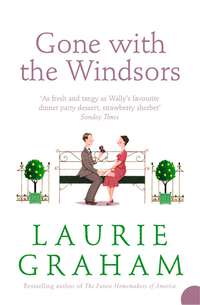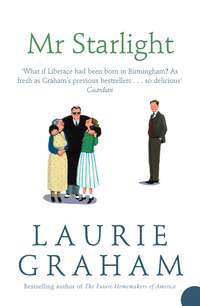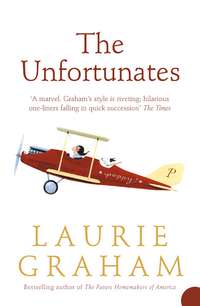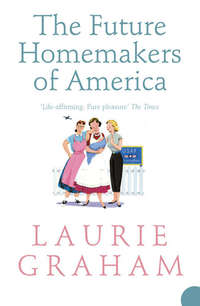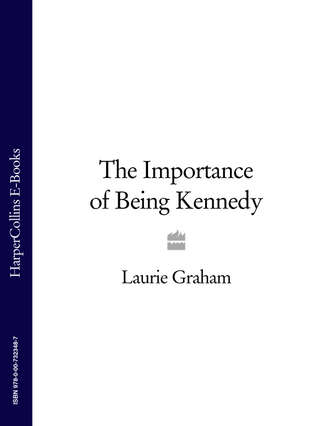
Полная версия
The Importance of Being Kennedy

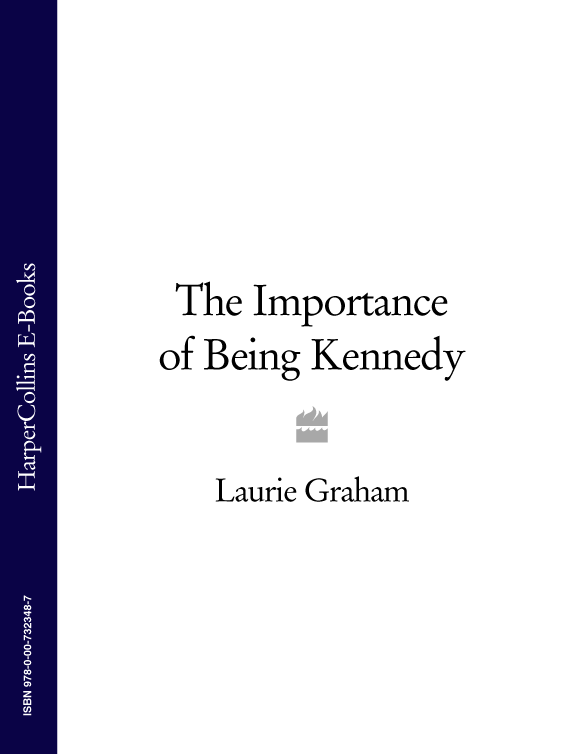
LAURIE GRAHAM
THE IMPORTANCE OF
BEING KENNEDY

To Jeremy Magorian,
Venice's own Mrs Thrale
Table of Contents
Prelude
Chapter 1 - Accidentally, Through The Keyhole
Chapter 2 - The Right Kind Of Family
Chapter 3 - The Trouble With Blood Fitzwilliam
Chapter 4 - A Perfect Little Doll
Chapter 5 - A Washer And A Dryer And Separate Beds
Chapter 6 - Two-Toilet Irish
Chapter 7 - Three Categories Of Feeble-Mindedness
Chapter 8 - Learning The Ways Of The Enemy
Chapter 9 - Another Little Blessing
Chapter 10 - Kennedys Everywhere, Like A Rash
Chapter 11 - The Sacred Duties Of A Wife
Chapter 12 - No Crybabies, No Losers
Chapter 13 - An Anniversary Trip For One
Chapter 14 - Something In The Blood
Chapter 15 - The Queen Of Bronxville, The Queen Of England And Walter Stallybrass
Chapter 16 - The Fox Supervises The Henhouse And Mr Chamberlain Goes To Munich
Chapter 17 - Other People's Babies
Chapter 18 - Our Pope
Chapter 19 - The Season At The End Of The World
Chapter 20 - Keeping Going With A Cheery Smile
Chapter 21 - Future Prospects Unknown
Chapter 22 - Everything By The Book
Chapter 23 - An Insult Of A Cake
Chapter 24 - A Broken Doll
Chapter 25 - Girl On A Bicycle
Chapter 26 - A Trainee Duchess
Chapter 27 - The Beginning Of The End
Chapter 28 - A Real Winner, With A Bit Of Grooming
Chapter 29 - A Kennedy Poodle
Chapter 30 - Perpetual Light
Chapter 31 - The Latest Thing For Diseases Of The Mind
Chapter 32 - The Official Black Sheep
Chapter 33 - The Irish Card
Chapter 34 - Mr Congressman Kennedy
Chapter 35 - A Day Of Tears
Also by Laurie Graham
Copyright
About the Publisher
PRELUDE
I happened to be in London in January 1970 when I got a call from my office to say my Aunt Nora had died. We were just finishing up the photo shoot for a big piece on platform shoes for Sassy! magazine so I was able to get away to Derbyshire in time for her funeral. Darling Aunt Nora, who'd started life three to a bed in Ballynagore, had a duke and a duchess at her Requiem Mass. If Aunt Ursie had lived to hear that she'd have popped her corset bones.
I didn't really start getting to know Aunt Nora till she ferreted me out in Saks Formal Wear in 1947 and stood me lunch. She had a nifty figure and beautiful skin for a woman in her fifties. She was wearing a tweed suit, I remember, petrol blue, fully lined, with a great corded buttonhole detail. Old-fashioned but very classy.
She said, ‘It's one of the perks of working for a lady who keeps up with trends. When the rest of the world won't be seen dead in a garment it can always be passed along to the help.’
We hit it off right away. She'd been a hazy, absent relation when I was a kid. She did visit, but too rarely for me to know her.
‘Your Aunt Nora is with the Kennedys,’ Mom used to say, and as we had another aunt who was a nun in Africa I also pictured Aunt Nora in a grass skirt and the Kennedys as some kind of ferocious tribe. In a sense I suppose I wasn't so very wrong.
Aunt Nora was a blast. I relished the letters that came each year with her Christmas card, her annual report on life as a gardener's wife on the great Chatsworth estate of the Duke of Devonshire. ‘Another twelve months of 'tater peelings,’ as she called it.
She outlived four of the nine Kennedy babies she'd raised. When Jack was killed in 1963 she wrote me that she had not watched the funeral. She said, Stallybrass was glued to the telly all afternoon but I walked to Hassop and prayed the rosary till it was over. I don't care for the telly myself. They tell you the same thing over and over. Walter loves his cowboy shows and I'll sit with him for company, but I turn my chair round the other way and get on with my knitting. Anyway, Jack's dying didn't shock me the way it shocked the rest of the world. I kept the death watch over Jack Kennedy more times than the sands are numbered and I could have swung for him once or twice too, little devil that he was. But my heart does go out to Mrs Kennedy. This is surely too much even for that tough little nut to endure.
Bobby Kennedy's death and old Joe Kennedy's, she hardly mentioned. Her own health was failing by then, though I didn't realize it. As her beloved Walter put it, ‘Nora were never one to skryke about her aches and pains.’ I asked him if she'd believed there was a gypsy curse on the Kennedys. There had been a lot of stories about that, after Jack and Bobby's deaths.
‘Nay, lad,’ he said. ‘In fact it got on her pippin when folk brought that up. Nora always reckoned old man Kennedy didn't need any gypsy curse to bring him calamities. He brought them on himself, the way he thought he could buy the world, the way he pushed them lads into the spotlight. Pride goeth before a fall, that were her opinion.’
I said, ‘I wish Aunt Nora had written about her Kennedy years. She must have had some stories.’
He said, ‘But she did write about them. That first cottage we had at Edinsor, she sat at the kitchen table and wrote everything down in exercise books. She called it her “Memoirs,” said she were only doing it to stop herself going round the bend with nothing to look at only sheep and trees. She liked the city best, you know, Nora? She liked busyness. She only endured all this beautiful countryside for me, God bless her. Should you like to see her writings some time? If my memory serves, they're in the back of her tallboy.’ So Aunt Nora's notebooks, with multiplication tables printed on the back cover and that old-lady smell of mothballs and dried lavender, came into my possession. This is her story.
Ramon N. Mulcahy, New York, 1972
ACCIDENTALLY, THROUGH THE KEYHOLE
Herself came to the house at Smith Square. It was April 1948. She was meant to be going directly to Paris for gown fittings but then she announced she was coming to London first, to visit with Kick. Landed on us with all her bags and baggage as if it was the Ritz we were running. Now I've seen Mrs Kennedy walk away when her own child lay sick in bed, turn her back on him sooner than delay a shopping trip, so we knew she wasn't coming for the pleasure of it. There was trouble on the agenda.
Walter had to have the car at the aerodrome by eight o'clock. Too early for Kick to get herself out of bed and go with him.
I said, ‘I'd have thought you'd make the effort. Go and meet her, get off on the right foot.’
‘No fear,’ she said. ‘Talk about being trapped in a confined space. It could feel like a very long drive.’
I was worried Mrs K would start quizzing Walter about what had been going on, if she had him to herself. I said, ‘Just act dumb.’
‘Nora,’ he said, ‘I don't need to act. When you've been driving gentry for thirty-five years dumb comes natural.’
It was about eleven when they arrived. She looked as smart as a brass button, as usual. You'd never have guessed she'd been on an airplane all night. She walked right past me in the hallway, unsnapped the fox head on her stole, handed it to Delia and made straight for the drawing room still wearing her little hat, one of those round chocolate-box affairs with a bit of net veiling that came down over her brow.
‘Kaaaaathleeen,’ she started. ‘We are going to have a very serious talk.’
I don't care how many elocution lessons she's taken, she still has a voice on her that would clip a thorn bush. And it was something to see how that girl crumbled the minute she saw her mammy. She was like a naughty child who knew she'd be getting the strap.
It was all about Blood Fitzwilliam. It had finally dawned on Mrs K that Kick wasn't as worried as she might have been about her money being cut off, so she'd come in person to threaten her with the everlasting fires of hell. The lovebirds were in the country when the cablegram came, seeing his horses put through their paces on Newmarket Heath, but Kick came hurrying back to town as soon as she heard her mammy was coming. She knew she was in hot water.
She said, ‘Mother can have my room. The guest room's too small for her. Give my room an extra spit and polish. I want everything to be perfect.’
I said, ‘Then you'd better get yourself round to Farm Street and see Father D'Arcy because the first thing she'll want to know is, have you been to confession? What bedroom we put her in will be the least of it.’
She gave me one of her monkey faces. And that room of hers needed more than spit and polish. I've done my best with those children over the years but there's not a one of them ever learned to hang up a jacket.
I said, ‘What will we do about dinners? Will you have company in while she's here?’
She said, ‘If you mean Blood, no. He's going to make himself scarce. Maybe I'll invite Sissy though. Mother thinks Sissy sets the perfect example. Or maybe we should have tray suppers and I'll read aloud from Lives of the Saints. I just want to stop her ranting till Daddy's met Blood. He'll talk her round. I think Blood and Daddy'll really get on.’
I didn't. No more than a pair of turkey cocks could be left in the same pen. Mr K liked people he could order around and so did Lord Fitzwilliam. And as for anybody talking Herself round, the very idea was nonsense. There was only ever going to be one thing that would satisfy her, and that was for Kick to go home and marry a nice Catholic boy, if one could be found who'd overlook her history. I knew Kick would put up a fight but I was sure her mammy would win the day and that'd be the end of that. Blood Fitzwilliam would be given his marching orders, Smith Square would be let go and so would we.
Well, then it started. All you could hear was Mrs K's voice.
‘Look at me when I'm talking to you, Kathleen.’
‘Perfect purity and self-control, that's what you were taught at Sacred Heart.’
‘After everything that's been done for you, Kathleen Kennedy. Every advantage in life you've been given.’
The few bits I didn't manage to hear accidentally through the keyhole I could guess. Promises of hellfire and damnation. The threat of being cut off, not just from her daddy's deep pockets. From the holy sacraments as well. As long as her mammy was calling her ‘Kathleen’ I knew there had been no progress. They'd had no lunch, not even a glass of soda taken in, and it got well past the time when Mrs K usually takes her afternoon rest. Then things fell quiet. Herself came out from the drawing room and told Delia she was going upstairs to nap and wasn't to be disturbed till five o'clock. Kick was asleep in an armchair when I went in, curled up in her stocking feet with a little sodden hanky balled up on her lap. Round One had gone to Mother.
Then it was my turn.
Delia said, ‘She's rung for a glass of milk, Nora, to be taken up by you, most particular. Thank God. She frightens the bejaysus out of me.’
There she lay, waiting for me, in those old pink napping pyjamas she's had for a hundred years and frownies stuck all over her forehead, to smooth out any lines the morning's shenanigans had brought on. She was a sight. You wouldn't have known her for that bandbox little body that had walked in from the limousine.
‘Nora, dear heart,’ she said. Patted the bed for me to sit down like we were old pals. ‘What a to-do. Now, I need you to help me.’
So it was ‘Nora dear heart’, for the time being. But I've been long enough around Mrs K to know you can be a ‘dear heart’ one minute and on the bus with your valise and no references the next.
She said, ‘This is a very grave situation. Kathleen still talks of marrying this person. Did you know? Has she talked to you about her plans?’
I said, ‘As far as I know Lord Fitzwilliam didn't get his divorce yet.’
‘Well,’ she said, ‘that's something. I wonder how it's being arranged? I wonder whether the wife could be persuaded to keep him? What do we know about her? Would she be interested in money?’
I said, ‘I believe she has money.’
She said, ‘I'm sure she could use more. It isn't just the marriage, though that must be prevented at all costs. But talk can be very damaging too. I'm normally very attentive to these things, but I'm so far away, and then I was busy with Jack's campaign. It's difficult to manage these things from the other side of the world. You might have said something, Nora. You might have dropped me a little note. You've been treated very generously over the years. Allowed back on the payroll after an act of great disloyalty. I'd have thought at the very least you'd have had Kathleen's well-being at heart.’
I said, ‘I thought Jack would have told you. He heard all about it when he was here last summer. I don't see how it was my place.’
‘Jack's in office now,’ she said. ‘He's far too busy, though I'm sure he would have mentioned it if his health had been better. He came back from London with a tired liver. I had to find him a doctor and then get him back on his feet. It's all been such a worry. And now this. If I'd known when she arrived at Palm Beach what she'd come to tell us, I'd have had Archie Spellman down to speak with her immediately. She wouldn't have dared defy a cardinal.’
There was a lot I could have said. I didn't like Lord Fitzwilliam, ‘Blood’ as his pals called him, and I was certain Kick could have done better for herself, but I know there's no reasoning with the love-struck. It was my opinion that if we left well alone it might not come to a marrying. For one thing he didn't seem in any great hurry to get his divorce. In fact there were quite a number of people who said he wasn't serious about getting one. Why would he go to the expense of lawyers when his wife didn't seem to care who he saw or what he did? And they'd houses enough never to have to see one another. Obby Fitzwilliam was known to be a very devil for the drink but she had money, and a drunken old bird in the hand might be worth a lot more to him than a Kennedy cut off without a cent. I thought if he dragged his heels Kick might tire of waiting for him, or that someone else would come along and catch her eye. Sure, half of London was in love with her. But I didn't tell Herself any of that. I didn't approve of what Kick was doing but that didn't mean I had to do Mrs K's dirty work for her.
I said, ‘I'd just like to see her happy. She's had enough sadness for such a youngster.’
Mrs K said, ‘We've all had sadness. And if it's happiness she wants she won't find it by breaking every rule she was raised by. Associating with a married man. That's not a path to happiness. And he's a Protestant. A married Protestant! I can hardly think of anything worse. It's her duty to set a good example, Nora, particularly now Jack's in Congress. We're all in the public eye, just as we were when we were Ambassador. What if Catholic girls start saying, ‘Look at Kathleen Kennedy. She does as she pleases, so we'll do the same.’
I said, ‘If she's here in London I don't see how girls in America will even know what she's doing. If they're interested in anybody it'll surely be Euny and Pat and Jean. And I don't see how it affects Jack. A congressman isn't like a monsignor, and just as well. Jack's no saint himself.’
‘Jack doesn't need to be a saint,’ she said. ‘Boys are different. They have to be men of the world to get ahead. But women set the moral tone.’
I said, ‘Well, Kick's twenty-eight years old and a widow and a Ladyship, so I can hardly presume to catechise her now.’
‘Of course you can,’ she said. ‘That's precisely what you can do. It's never too late. You disappoint me greatly, Nora.’
Then she closed her eyes, which is always her way of saying the conversation is over. That neat little foldaway face.
Four days we had of it. Threats and lectures and tears, and all the time I knew Kick was clinging to one silly thing her daddy had said on the telephone. That if it could be shown Blood Fitzwilliam had never been baptised, then his marriage to Lady Obby wouldn't count and he'd be free to take instruction and marry Kick in a proper Catholic church. It was all moonshine of course. The Fitzwilliams weren't the kind of family that would have overlooked baptising their son and heir, but it was typical of Mr Kennedy to dream up something like that, ducking and diving under the regulations until he found a wee hole to slip through.
I'll say this for him, though. He just wanted his girl to be happy. He knew nothing she did was likely to harm Jack's prospects, nor Bobby's, nor Teddy's. He'd see to that. The boys were his affair and whatever happened, whatever trouble they got into or talk there might be about the family, he'd keep things on track for them.
Kick cried and begged, but when it really came down to it she didn't care what her mammy did. She absolutely would not promise to give up Fitzwilliam. So Mrs Kennedy had Delia pack her bags for the onward journey to Paris and the car was ordered to take her to the aerodrome. It was an ugly leave-taking.
She said, ‘I won't stay another night in this house. You've fallen into bad company, Kathleen, and I rue the day we ever brought you to England. The Mothers at Sacred Heart laid out your path but you've deviated from it, and so deliberately too. No one can ever excuse you; no one can say you weren't taught right from wrong. Well, if you really refuse to acknowledge your errors I shall see to it you at least don't ruin your sisters with your carrying-on. They'll have nothing more to do with you. Don't telephone because they won't accept your calls and don't send letters because I shall have them burned. There's nothing more to be said until you're ready to repent.’
I was just standing there like an article of furniture, holding that horrible wrap with the fox head dangling over my arm. It seemed to me I didn't have a lot left to lose.
I said, ‘I never heard such a cruel thing. A girl needs her family, and the bigger the muddle she's in, the more she needs them, and sure weren't you the one always taught them to put family before everything else?’
‘Nora Brennan,’ she said, ‘you should have been let go years ago. I wouldn't have kept you on, married in a town hall. Well, now we see what an influence you've been. Now we see it clear. I'll pray for your soul, Kathleen. I can't do more. Until you mend your ways I will not see you. You'll be dead to me.’
She said it flat, with that darling girl standing right there. How does it sit with her now, I wonder, seeing the way things turned out? How many times has she wished she could take back those terrible words? Anyone might say a thing in anger, then wish it unsaid, but Rose Kennedy isn't anyone. I've been around her long enough to know. For a woman who's a Gold Star mother she has a heart as hard as the hob of hell.
THE RIGHT KIND OF FAMILY
I came to work for the Kennedys in the spring of 1917. I'd been five years in America by then, come over to be with my two sisters. Marimichael Donnelly from across the lane was on the same sailing as me. They waked us two nights together before we left, with whiskey drummed up from somewhere by the Donnelly boys, telling us what a grand future the both of us had and then weeping and clinging on to us to keep us at home. We'd neither of us been out of Westmeath before. I'd never appreciated that sky and water could stretch so far, and I know they say the world's like an apple and doesn't have an edge a ship can tumble over, but I've never understood how they know. I was braced for the end all the way, till I saw the roofs of East Boston.
Marimichael had a sister who'd gone ahead too. That was how we did it in those days. The oldest one went, then she'd send the fare for the next and so on, till everyone was settled. It was the only thing to do. The factories were starting up around Tullamore so the demand for hand-knitting was dropping off and there was no other way to make a living.
We were six in our family, one boy and five girls, except Nellie was in the graveyard, dead with the measles and only four years old. Ursie's the oldest. She left for Boston in 1909. Took a correspondence course in bookkeeping and taught herself the Pitman shorthand and she was off. She got work in the office of Holkum, Holkum and Jauncey, and to hear her she ended up practically running the place.
Ursie always had ideas. Writing paper without lines was one of her things, not that there was a lot of letter writing went on in our house, but she said lined paper was common, and she used to have a fit if ever Mammy put the milk can on the table instead of the china pitcher. After she got to America and started earning she'd send us marvellous things, not only money. Caramels and hatpins and silk stockings, and a beautiful handbag for Mammy one Christmas, real leather from Jordan Marsh, with a big, gilt snap. Dear God, we had everyone from Ballynagore come in to view that handbag. We should have charged to see it.
She must have had some courage to go off like that, not knowing a living soul in America. When they were handing out gumption I reckon Ursie got Edmond's share. He's hardly been further than the foot of the stairs.
Margaret went out to join Ursie in 1910 and I cried myself sick. Ursie wasn't the kind of sister you missed, except like an aching tooth after it's been pulled, but Margaret had always been my pal. We'd shared a bed, even. When Mammy and Deirdre went to wave her off on the bus I couldn't bear to go with them. I was convinced I'd never see her again. She kept saying, ‘You will too. I'll send for you and then you'll send for Deirdre.’
But Deirdre could never have gone to America. She had a sweet nature and the voice of an angel but she was the kind of girl that would easily be taken advantage of. She used to get confused enough in Tullamore market so she'd have been lost in a minute in Boston. Anyway, Father Hughes said a girl like Deirdre would likely be blessed with a vocation, so we all prayed for that and our prayers were answered. She went to the Maryknoll Sisters, and then to Africa to teach little black children about our Risen Lord, which left just me at home and Mammy and my brother Edmond.
Ursie kept writing that I should still think of going to America. Mother won't stand in your way, she wrote. She didn't call her ‘Mammy’ any more, since she worked for Holkum, Holkum and Jauncey. She'll be a lot happier knowing you're making something of yourself. She has Edmond to take care of her.
Edmond was supposed to be the head of the house. Dada had the Irish disease and after we lost Nellie he just turned his face to the wall and died.
Mammy used to say, ‘Edmond's a thinker. He doesn't rush into things. And did you ever see such a fine head of hair on a man?’
Well, that part was true. I believe it acted like a goose-feather comforter. It kept his noddle so warm and cosy his brain fell asleep.
I don't know whether I would have gone and left Mammy in his care, but anyway, as things turned out it was Mammy who left us. She'd a growth under her left bosom that had eaten her away inside and she'd been too shy to say anything until it was too late.
‘Never mind,’ she said. ‘I've had a good life. I've had my span.’


